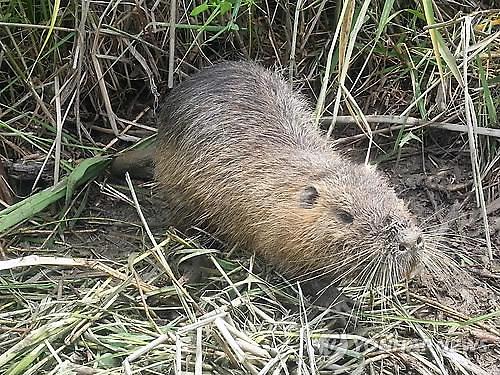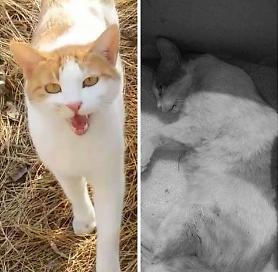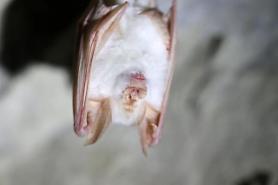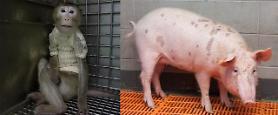
Coypu, a large, omnivorous and semiaquatic rodent also known as nutria, has been hunted widely as a pest for destroying South Korea's ecosystem as well as agriculture.
Intended to incite bounty hunting or not, South Korean scientists found a use for health and beauty builders, saying the coypu (Myocastor coypus) is a perfect alternative to obtaining base materials for cosmetics and bile acid.
Originally native to subtropical and temperate South America, coypus were introduced in South Korea in the 1980s for fur farming. However, the omnivorous rodent soon became a pest after escaping to the ecosystem.
An academic study showed that coypus have fully adapted themselves to the various environment of wetland, river, stream in South Korea with intense habitation made along Nakdonggang, the country's longest river that passes through southeastern provinces.
Agriculture along Nakdonggang has suffered the most because the area is concentrated with crop fields for sweet potatoes, carrots and other vegetables.
Damage has been so severe to warrant bounty hunting. Thousands have been netted every year on rewards of up to 30,000 won (25 US dollars) offered by local governments, but their campaign to stop an invasion was largely unsuccessful. Coypu hunting became a popular sport among bow hunting communities in 2010 but the hype soon cooled down due to reduced rewards.
 Coypus destroy aquatic vegetation, marshes, and irrigation systems, eroding river banks and displacing native animals. Besides breeding quickly, each coypu consumes large amounts of vegetation. A mature coypu averages 5.4 kilograms (12 lbs) in weight.
Coypus destroy aquatic vegetation, marshes, and irrigation systems, eroding river banks and displacing native animals. Besides breeding quickly, each coypu consumes large amounts of vegetation. A mature coypu averages 5.4 kilograms (12 lbs) in weight.
While many attempts have been made across the world to establish markets for coypu meat, most documented cases have generally been unsuccessful.
Now South Korean scientists have discovered an attractive method to instigate the value of coypu meat, fat, and gallbladder.
Coypu meat is low in cholesterol and contains a fatty acid that could be used as base materials for cosmetics, a veterinary team at Gyeongsang National University in the southern city of Jinju said in a research paper.
Enough to attract positive attention from those trying to promote health, the paper said the coypu gall bladder contains a good amount of bile acid, an expensive and crucial part of the oriental medicine.
The average amount of ursodeoxycholic acid, also known as ursodiol or UDCA, contained in the gallbladder of a wild coypu is 43.8 percent, far higher than any bear "urso", it said.
There is no evidence that bear bile has any medicinal effect, though bile, a digestive fluid produced by the liver and stored in the gallbladder, has long been used by traditional Chinese medicine practitioners.
In South Korea, bear farming for gallbladders was banned in 1992. However, bears are still on illegal farms as many still trust the efficacy of bile products claimed by Chinese herbalists. To hide from the animal protection law, some illegal bear farmers have moved to Southeast Asian countries and their main customers are South Korean and Chinese tourists.
The research paper aroused a mixed online response. some duck squeezers welcomed it while animal lovers expressed concern about cruel bounty hunting.
"It may promote a campaign to eradicate (coypus). After all, we may have to designate them as an endangered species," commented "Prince", a user of South Korean portal service Daum.
"Schindlers list", another user, argued the research paper revealed the "merciless and cruel nature of human beings". "In the ecosystem, humans are the cruelest and dangerous destroyer of all.

A farmer brutally beats a wild a coypu to death. [MERLION TV YouTube channel]
Coypu, a large, omnivorous and semiaquatic rodent also known as nutria, has been hunted widely as a pest for destroying South Korea's ecosystem as well as agriculture.
Intended to incite bounty hunting or not, South Korean scientists found a use for health and beauty builders, saying the coypu (Myocastor coypus) is a perfect alternative to obtaining base materials for cosmetics and bile acid.
Originally native to subtropical and temperate South America, coypus were introduced in South Korea in the 1980s for fur farming. However, the omnivorous rodent soon became a pest after escaping to the ecosystem.
An academic study showed that coypus have fully adapted themselves to the various environment of wetland, river, stream in South Korea with intense habitation made along Nakdonggang, the country's longest river that passes through southeastern provinces.
Agriculture along Nakdonggang has suffered the most because the area is concentrated with crop fields for sweet potatoes, carrots and other vegetables.
Damage has been so severe to warrant bounty hunting. Thousands have been netted every year on rewards of up to 30,000 won (25 US dollars) offered by local governments, but their campaign to stop an invasion was largely unsuccessful. Coypu hunting became a popular sport among bow hunting communities in 2010 but the hype soon cooled down due to reduced rewards.

[Yonhap Photo]
While many attempts have been made across the world to establish markets for coypu meat, most documented cases have generally been unsuccessful.
Now South Korean scientists have discovered an attractive method to instigate the value of coypu meat, fat, and gallbladder.
Coypu meat is low in cholesterol and contains a fatty acid that could be used as base materials for cosmetics, a veterinary team at Gyeongsang National University in the southern city of Jinju said in a research paper.
Enough to attract positive attention from those trying to promote health, the paper said the coypu gall bladder contains a good amount of bile acid, an expensive and crucial part of the oriental medicine.
The average amount of ursodeoxycholic acid, also known as ursodiol or UDCA, contained in the gallbladder of a wild coypu is 43.8 percent, far higher than any bear "urso", it said.
There is no evidence that bear bile has any medicinal effect, though bile, a digestive fluid produced by the liver and stored in the gallbladder, has long been used by traditional Chinese medicine practitioners.
In South Korea, bear farming for gallbladders was banned in 1992. However, bears are still on illegal farms as many still trust the efficacy of bile products claimed by Chinese herbalists. To hide from the animal protection law, some illegal bear farmers have moved to Southeast Asian countries and their main customers are South Korean and Chinese tourists.
The research paper aroused a mixed online response. some duck squeezers welcomed it while animal lovers expressed concern about cruel bounty hunting.
"It may promote a campaign to eradicate (coypus). After all, we may have to designate them as an endangered species," commented "Prince", a user of South Korean portal service Daum.
"Schindlers list", another user, argued the research paper revealed the "merciless and cruel nature of human beings". "In the ecosystem, humans are the cruelest and dangerous destroyer of all.
Copyright ⓒ Aju Press All rights reserved.




